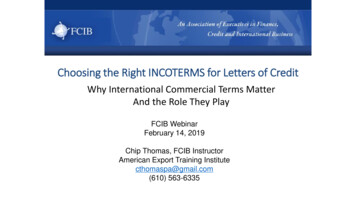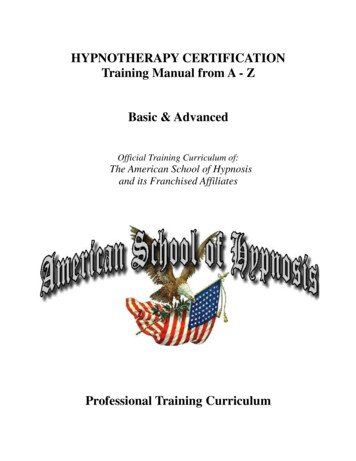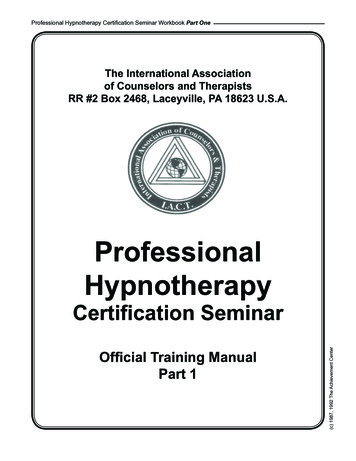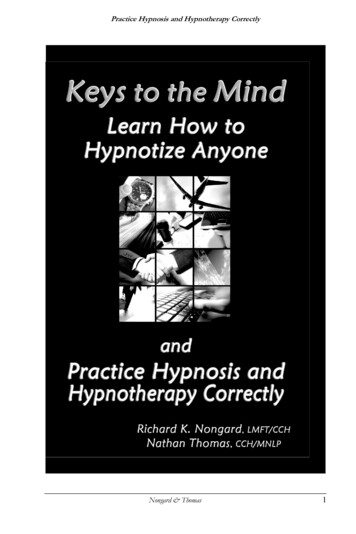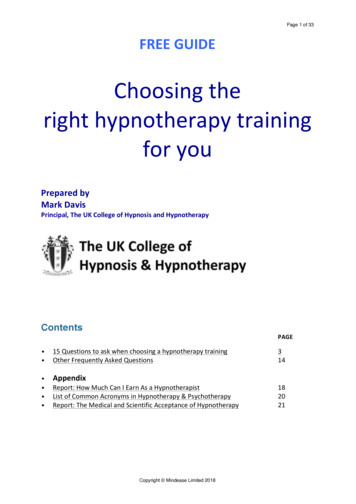
Transcription
Page 1 of 33FREE GUIDEChoosing theright hypnotherapy trainingfor youPrepared byMark DavisPrincipal, The UK College of Hypnosis and HypnotherapyContentsPAGE 15 Questions to ask when choosing a hypnotherapy trainingOther Frequently Asked Questions AppendixReport: How Much Can I Earn As a HypnotherapistList of Common Acronyms in Hypnotherapy & PsychotherapyReport: The Medical and Scientific Acceptance of HypnotherapyCopyright Mindease Limited 2018314182021
Page 2 of 33INTRODUCTIONThere are few things more confusing than the many different types of training, qualifications and organisations in the world of hypnotherapy training.It’s not hard to teach basic hypnosis, at the same time many people seem to lose all critical thinkingwhen it comes to learning hypnosis. Combine this with a lack of agreed training standards and nogovernment regulation, and you end up with a market that allows for some very poor training indeed.We constantly hear stories about poor training materials, incoherent information and a meagreamount of real clinical skill development.The famous hypnotherapist Gil Boyne, who passed away recently, set up many of the training programmes around the world. He was rightly shocked at the quality and hype surrounding many hypnotherapy training schools and would start each course inviting participants to “name and shame” othertraining schools! We aren’t going to do that here. However, we do encourage you to keep your critical thinking engaged as you do your research. The questions below have been put together based on10 years of teaching and talking to students.You might find it helpful to keep a spreadsheet with the names of the training schools, their websitesand the answers you get to these questions. We hope you find them helpful and invite your feedback.Copyright Mindease Limited 2018
Page 3 of 3315 Questions to ask yourself (or the training provider)when choosing a hypnotherapy training1. What sort of hypnotherapy do you want to train in and practice? (the four main typesof hypnotherapy)2. Do you want to learn a more scientific approach or a more alternative approach?3. What sort of course format suits you?4. What award is given? Is it externally awarded? It is accredited and recognised by arange of independent professional organisations? What assessment is required of students to obtain the qualification or are all attendees awarded?5. How much does the course cost and how many training days and hours do you get foryour money? How much will it cost overall in terms of travel, accommodation, etc?6. Is the course giving a solid coherent foundation upon which to build, or does it cover awide range of differing models/ ideologies?7. Will you be learning how to think and plan treatments like a therapist, designing customised approaches for each client? Or will it be entirely script-based?8. Will you learn a range of techniques or just one main technique?9. How much practical experience does the course offer vs theoretical content?10. Will the training allow you to study other mainstream psychotherapy approaches(like Cognitive Behavioural Therapy) or does it keep hypnotherapy as something separate? Will you be able to engage with the rest of psychology or be limited to hypnosis/trance/NLP discussions?11.What are the textbooks for the course?12.Will I be learning a “Purple Hat Therapy”?13. What training materials are provided? Can an excerpt from a course manual be provided before booking?14.Who is the main trainer? What is their background? Are they also a therapist?15. What guidance and information is provided into setting up and running your ownpractice/business? What post-course support is provided?Copyright Mindease Limited 2018
Page 4 of 33Question 1: What sort of hypnotherapy do you want to train in and practice?Hypnosis has evolved over the last 150 years. Thanks to a great deal of research, there is a growingrealisation that many of the practices being taught are questionable and lacking in evidence.The main types of hypnotherapy that are taught and practiced are:1/ Traditional Hypnotherapy2/ Hypno-Analysis (Regression Hypnotherapy)3/ Ericksonian Hypnotherapy (and/or NLP)4/ Cognitive Behavioural HypnotherapyWhat follows is a brief explanation of each approach and the pros and cons of each approach. Themost important questions to consider are a) Is there any evidence for the approach? and b) What sortof therapy do I want to practice?This is the longest answer but probably the most important in terms of understanding the pros andcons of each approach.1/ Traditional HypnotherapyThe core of the approach is direct suggestion for improvement of symptoms. For example, “Everyday you will begin to feel calmer and more confident that old discomfort and worry are fading, fading, fading and you step forward each day with greater ease and comfort, strength and confidence ”Hypnotherapy’s current reputation is mostly based on the traditional approach. It is quite mechanisticin terms of how this traditional approach understands what happens in hypnosis, with the suggestions of the therapist somehow putting the client (mechanically) into a “trance”, where their mind isreceptive to the words of the therapist as outside influences that can’t be resisted (rather than theclient being engaged and having some “agency”). There is good evidence for this approach being usedfor pain control, inducing relaxation, treating irritable bowel syndrome and some simple forms of anxiety.Pros:- Simple and straightforward- Can be effective for many simple or specific conditionsCons:- Some clients don’t seem to respond.- The idea of a “hypnotic trance state” puts off some clients and isn’t really needed. Moreover, it isdisconnected from most of mainstream psychology and leaves hypnosis as a strange outlier in abnormal psychology.- Simplistic, mechanical model of how hypnosis works- Fails to understand underlying patterns of thought, feelings and behaviour that could be causing thesymptoms. This means that the symptoms are not being properly addressed.2/ Hypno-analysis (Regression Hypnosis)Basically a neo-Freudian approach popularised by Dave Elman, which sees psychological problems asoriginating in some trauma or unresolved event in the client’s past. Clients are regressed back to thecause or event, the emotion is released and that event is experienced differently. It’s a model thatCopyright Mindease Limited 2018
Page 5 of 33sees clients as being trapped by their past, victims of their sub-conscious. However, it does hold aform of romantic appeal for some. There is little evidence for its effectiveness and today psychologists would be concerned about the possibility of creating false memories or triggering unnecessaryemotional reactions during regression. This type of hypnotherapy was very popular in the 1950s and60s, but lots of training schools still teach this.The claim is that unless the root cause is found and resolved then the suggestions given in hypnosiswon’t “stick”. Modern approaches focus more on “maintaining factors” or “vicious circle” of thoughts,feelings and behavior – and how to break that vicious circle.It also robs of the client of their own power, putting the therapist in a more powerful role, which goesagainst a lot of recent research that indicates therapy is more successful when the locus of control iswith the client.Also, clients can often experience very intense emotions that may re-traumatise them. Memories under hypnosis are more vivid and can feel more true, but research shows that memory is an active reconstruction and so can be influenced by the present context.The American Psychological Association considers regression hypnosis to be so risky that they requiretheir members to give clients a letter informing them of the risks for them to sign.Pros:- Often a very attractive, somewhat “magical” model that appeals to the idea that we are trapped byour past.Cons:- Little evidence of effectiveness.- Little evidence that the client’s presenting problems originate in an initial sensitising or traumaticevent.- Memories recalled under hypnosis are not necessarily accurate but can be experienced as more realthan original memories – leading to issues of false memories being created.3/ Ericksonian Hypnotherapy (and NLP)Based on the approach of Milton Erickson, who believed the client’s conscious mind was often theproblem, that the unconscious could find creative solutions and that hypnotic trance occurred naturally, even spontaneously. There is particular focus on the conscious mind of the client being resistant, with the solution already present in the client’s unconscious. In Ericksonian hypnotherapy, thetherapist might communicate in a way that, without the client knowing or being able to resist, theyenter hypnosis and the therapist then implants messages in their communications that are acceptedby the client’s unconscious. The hypnotherapy is often quite indirect, sometimes covert and the therapeutic ideas can be embedded in stories, confused messages and metaphors.Pros:- Claims to be particularly effective with clients who are “resistant” or very controlling.- Has a romantic perhaps magical appeal.- Appeals to those who like to view the hypnotherapist as a sort of master or guru (which is certainlythe way many people related to Milton Erickson).Cons:- Little evidence for Ericksonian hypnotherapy and no evidence that indirect, covert suggestions workbetter than direct (traditional hypnosis) suggestions.- Some research indicates that clients receiving indirect suggestions become more anxious and lesstrusting of the therapist.- Perhaps it is better to call this “indirect suggestion therapy”, as it appears to operate in a differentCopyright Mindease Limited 2018
Page 6 of 33way than normal hypnosis.- On the one hand, it’s difficult to learn this style of communication, and on the other hand it appearsto release the therapist from responsibility as everything depends on the client’s unconscious beingready to make changes!What about NLP?Very often Ericksonian Hypnotherapy is taught side-by-side with Neurolinguistic Programming (NLP).A sort of “grab bag” of different therapy techniques gathered from studying several “expert” therapists, NLP makes many quite grand claims that have so far not been substantiated by research. Thehandful of observations that make up its evidence base have mostly been proven false in more substantive, rigorous research. However, it has been sold strongly into personal growth and training environments.Pros:- Claims to teach simple, powerful techniques and that you can become a “Master Practitioner” in justseven days.- Claims to work fast and cures phobias in just one hour (with the Fast Phobia Cure).Cons:- Researchers in the psychological sciences no longer conduct any research into NLP.- Very little evidence to back up the strong claims it makes. Today clinical psychologists regard it aspseudoscientific and a relic of the 1980s.- Studies of the Fast Phobia Cure fared badly against established CBT treatment programmes.4/ Cognitive Behavioural HypnotherapyThis is both a return to Traditional Hypnosis and an important evolution. Firstly, it doesn’t considerhypnosis to require “trance” (whatever that really means) and, based on extensive research, it understands hypnosis as being focused attention, combined with a positive motivation and strong expectation, upon a dominant idea – and that profound changes in our experience can occur when we focusour attention on ideas in this way. It therefore doesn’t see hypnosis as a magical trance or alteredstate of consciousness – but more as something that the client is actively doing (hypnosis is an actthat client does, not a “thing” done to the client).In this approach, hypnosis is comprised of normal psychological factors used in a special way (ratherthan as a branch of abnormal psychology) and because of this it can be integrated into mainstreampsychology. Cognitive behavioural hypnotherapy (CBH) focuses on changing the symptoms (as in traditional hypnosis) as well as addressing the underlying thinking and behaviour that maintains thosesymptoms.Where hypno-analysis (regression hypnotherapy) focuses on “originating cause” as the powerful factor, CBH sees the “maintaining causes” as where we can make change. Rather than asking whatcaused it in the first place, the question CBH asks is, how is it being maintained and how can it bechanged?”Pros:- Sees hypnosis as something that the client does, and a skill that can be taught (all hypnosis is selfhypnosis in this model).- Integrates hypnosis with cognitive behavioural therapies.- Scientific, empirically driven model (rather than speculative).- Evidence-based approach (both evidence for the effectiveness of CBT approaches and also that addCopyright Mindease Limited 2018
Page 7 of 33ing hypnosis to CBT improves outcomes above CBT alone) .- A focus on client empowerment and teaching coping skills (a goal in CBT is that the client becomestheir own therapist).Cons:- It is focused on science rather than a more speculative/magical approach - this may not be appealing to some.At the UK College we teach Cognitive Behavioural Hypnotherapy – which means learning traditionalhypnotherapy too – as well as examining hypno-analysis and Ericksonian hypnotherapy, Incorporatingwhat is useful from those approaches. However, you won’t find us teaching NLP, regression hypnotherapy or covert hypnosis methods. These approaches, while attractive to some, make unsubstantiated claims with little evidence to back them up.———Copyright Mindease Limited 2018
Page 8 of 33Question 2: Do you want to learn a more scientific approach or a more alternative approach?Historically, there are two main approaches to hypnosis: one grounded in scientific language and enquiry; another more centred on speculative, “magical” notions, using the language of “trance”, “altered states of consciousness” and the “wonder of the
Hypnotherapy’s current reputation is mostly based on the traditional approach. It is quite mechanistic in terms of how this traditional approach understands what happens in hypnosis, with the sugges- tions of the therapist somehow putting the client (mechanically) into a “trance”, where their mind is receptive to the words of the therapist as outside influences that can’t be resisted .




